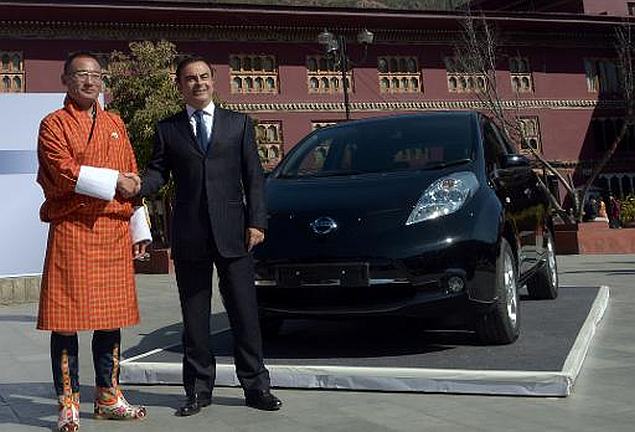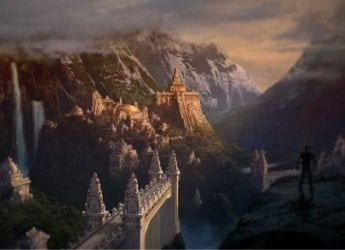Bhutan, world's last TV holdout, now at tech vanguard: PM

But Bhutan's decision to make itself the poster boy for electric transport is further proof of its willingness to embrace technology as part of its unique Gross National Happiness development model, says its prime minister.
In an interview with AFP after signing a deal with Nissan on Friday to import a fleet of battery-powered compact cars to the remote Himalayan nation, Tshering Tobgay said Bhutan was happy to be at the technological vanguard.
"Technology is not destructive. It's good and can contribute to prosperity for Bhutan," the prime minister said.
It was not always thus. The tiny kingdom was famously the last country to ever get television, finally embracing it in 1999, at a time when less than a quarter of households had electricity.
But it is rapidly shedding its reputation as a technophobe - it now exports electricity thanks to an ambitious hydropower programme, while smart phones are a common sight, at least on the streets of the sleepy capital Thimpu.
"Internet, cellular phones, smartphones, they are ubiquitous, you can't do anything without them, now they are essential tools," said Tobgay.
"Cellular phones became a reality 10 years ago. We adopted it very well, almost everybody has a cellular phone, that's the reality.
"Similarly today we launched the Nissan Leaf... Our goal is to make the best of all options," he added.
Under the deal with Nissan, dozens of battery-powered Leafs should soon be motoring along the streets of Thimpu, helping it avoid the kind of pollution pervasive elsewhere in South Asia.
Tobgay said Bhutan would never allow its environment to become a victim of economic growth -- an important principle of Gross National Happiness (GNH).
"Growth is important but it should be balanced with other aspects of life including culture, spirituality, heritage and sustainable development," said the prime minister.
"During the development of the last 30-40 years, we placed a lot of emphasis to promote the environment, clean industries.
"We are looking to become 100 percent organic, (although) it will take some time. And we are looking to develop a zero emission goal. This formulates a narrative of Bhutan, about what Bhutan is about and where Bhutan wants to go."
Tobgay, who came to power last July after winning Bhutan's second elections, has previously voiced a degree of scepticism about GNH - a philosophy originally espoused by a former king - as a distraction from tackling the country's problems.
But in his interview, the prime minister said addressing issues such as corruption, unemployment and the environment would allow Bhutan to practice what it preaches.
Guiding philosophy
"GNH should guide us, this philosophy should not be compromised," he said.
"But my stance has been that rather than talking about the GNH and debate the philosophy, we have to operationalise it."
With a population of just 750,000, Bhutan is in many ways a study in contrasts with its giant neighbours India and China, with their billion-plus populations and mega-cities.
Despite its stunning scenery, few tourists can afford to pay the $250 daily rate to visit the "Land of the Thunder Dragon".
But its abundant waterfalls and crystal-clear rivers have allowed Bhutan to become a significant player in the hydropower sector.
Bhutan now operates four hydroelectric plants which between them have almost 1,500 megawatt capacity -- at peak output roughly equivalent to a large nuclear power station -- and the surplus is sold onto India.
Tobgay said Bhutan would struggle to meet its capacity target of 10,000 megawatts by 2020 through the building of 10 new plants.
But he said there should be no doubting Bhutan's commitment to a zero emission target which would involve other renewable energies.
"We are looking also at solar panels, windmills, bio gas," he said.
"The important point is to make progress towards achieving our goal which is to harvest renewable energy and to use that renewable energy to power our own country and to power the energy needs of our neighbours with clean energy."
Catch the latest from the Consumer Electronics Show on Gadgets 360, at our CES 2026 hub.
Related Stories
- Samsung Galaxy Unpacked 2025
- ChatGPT
- Redmi Note 14 Pro+
- iPhone 16
- Apple Vision Pro
- Oneplus 12
- OnePlus Nord CE 3 Lite 5G
- iPhone 13
- Xiaomi 14 Pro
- Oppo Find N3
- Tecno Spark Go (2023)
- Realme V30
- Best Phones Under 25000
- Samsung Galaxy S24 Series
- Cryptocurrency
- iQoo 12
- Samsung Galaxy S24 Ultra
- Giottus
- Samsung Galaxy Z Flip 5
- Apple 'Scary Fast'
- Housefull 5
- GoPro Hero 12 Black Review
- Invincible Season 2
- JioGlass
- HD Ready TV
- Laptop Under 50000
- Smartwatch Under 10000
- Latest Mobile Phones
- Compare Phones
- OPPO Reno 15 FS
- Red Magic 11 Air
- Honor Magic 8 RSR Porsche Design
- Honor Magic 8 Pro Air
- Infinix Note Edge
- Lava Blaze Duo 3
- Tecno Spark Go 3
- iQOO Z11 Turbo
- Lenovo Yoga Slim 7x (2025)
- Lenovo Yoga Slim 7a
- Lenovo Idea Tab Plus
- Realme Pad 3
- Moto Watch
- Garmin Quatix 8 Pro
- Haier H5E Series
- Acerpure Nitro Z Series 100-inch QLED TV
- Asus ROG Ally
- Nintendo Switch Lite
- Haier 1.6 Ton 5 Star Inverter Split AC (HSU19G-MZAID5BN-INV)
- Haier 1.6 Ton 5 Star Inverter Split AC (HSU19G-MZAIM5BN-INV)







![[Sponsored] Haier C90 OLED TV | Dolby Vision IQ, 144Hz OLED and Google TV in Action](https://www.gadgets360.com/static/mobile/images/spacer.png)









